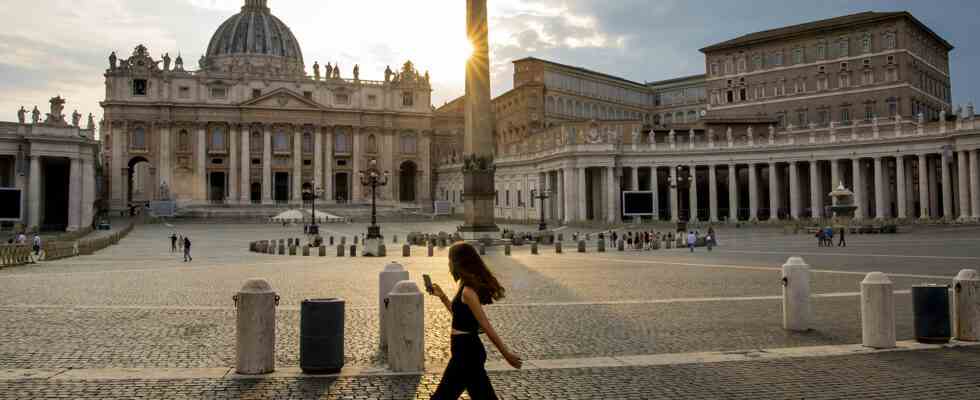Status: 07/22/2022 09:10 a.m
The Vatican’s ban on unauthorized reforms within the German church has met with fierce criticism there: It’s “not a good style of communication.” Other critics are even more explicit.
After the Vatican unilaterally banned the Catholic Church in Germany from far-reaching reforms, the German side reacted with open criticism. “It does not show a good style of communication within the church if declarations are not published that are signed by name,” said the chairman of the German Bishops’ Conference, Georg Bätzing, and the president of the Central Committee of German Catholics (ZdK), Irme Stetter-Karp a joint statement.
The Vatican had previously criticized the German reform efforts in an unsigned official statement: “The ‘Synodal Way’ in Germany is not authorized to oblige the bishops and the faithful to accept new forms of leadership and new orientations of doctrine and morality,” it said in the statement.
Reform process “Synodal Path”
The “Synodal Path” of the German Bishops’ Conference and the ZdK, which began in 2019, is a consequence of the abuse scandal. He is striving for reforms in four areas: dealing with power, Catholic sexual morality, the position of women and celibacy.
Concrete innovations that are being sought include a say for the faithful in the appointment of bishops, the blessing of same-sex couples and the diaconate of women, a precursor to the priesthood.
Reformers warn of loss of credibility
The Catholic reform movement “We are Church” also criticized the Vatican. She resolutely rejects the harsh and unjustified criticism of the “Synodal Path”. The statement, which was distributed without a sender, shows how dangerous the communication gap between the Vatican and the Catholic Church in Germany could be.
“A real danger to the unity and future of the church” does not come from Germany, but rather “from the forces in the church that fundamentally refuse to reform”. They have no answer “to the spiritual and sexualized violence that has led to a dramatic loss of credibility in the church and are not willing to deal with the systemic causes,” the movement explained.
Skeptics welcome Vatican statement
On the other hand, skeptics of the reforms welcomed the Vatican’s clarification. “I think it’s good that the Holy See has decided to make this statement,” said Bishop Bertram Meier of Augsburg. Among other things, he had stated in the past that there was no prospect of women being admitted to the priesthood. “The Holy See is not slowing down the ‘synodal path’, but it is trying to channel it and have it enriched by the universal church,” says Meier.
Critics fear that a German national church could emerge at the end of the “Synodal Path”. Pope Francis has repeatedly expressed skepticism about the reform project. He recently said that there is already a Protestant church in Germany – “we don’t need two of them”.
However, a large majority of the German Bishops’ Conference supports the project.
“Authoritarian and drenched in distrust”
According to the theologian Daniel Bogner, the harsh criticism from the Vatican shows that the Roman central administration fears it will spread to the Church in other countries. “In Rome there are obviously serious concerns that Germany could have an effect that would have consequences elsewhere,” said the professor of moral theology and ethics at the Swiss University of Freiburg of the dpa news agency.
In terms of form, the statement from the Vatican is a “poor and needy document,” said Bogner. “It appears authoritarian, is soaked in distrust and wants to let out a fire in the style of an administrative order for fear that it could infect others.” The text works with assumptions. “Because the German church never wanted to do anything on its own, but it did want to address things that, from their point of view, should also be discussed by the world church.”
It also becomes clear that Rome does not speak with one voice. Pope Francis himself calls for a listening, synodal style, but some of his curial authorities acted with a sovereign, centralist attitude. Many would now feel strengthened in their perception that the Roman church leadership is deepening a “schism from above”, i.e. a division, instead of promoting an open exchange.
Vatican reprimands synodal path
Elisabeth Pongratz, ARD Rome, 21.7.2022 4:06 p.m

